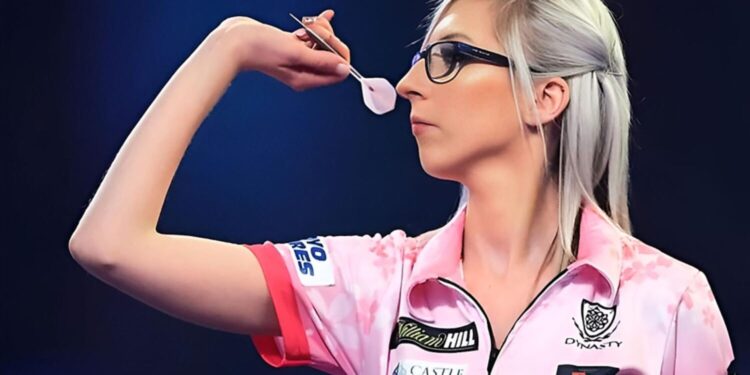**“Every day I woke up, I was in pain” – Fallon Sherrock Breaks Silence on Controversial Match**

Fallon Sherrock, one of the most recognizable faces in professional darts, has finally opened up about her physical and mental struggles in a controversial match that left her fans concerned and her critics vocal.
Known as the “Queen of the Palace” for her historic achievements, Sherrock has always been a trailblazer in the sport, especially as one of the few women to have made significant inroads in male-dominated competitions.
However, the toll of constant competition, physical demands, and mental pressure came to the forefront after a match that sparked debates and divided opinions.
In a recent interview, Sherrock revealed that the pain she had been enduring wasn’t just physical, but a manifestation of the grueling demands placed on her as both a competitor and a role model.
Her candid revelations about her health and well-being have opened up a broader conversation about the pressures athletes face, particularly in niche sports like darts, where resources and support may not always match the expectations placed on them.
### **The Physical Struggles: “I Was in Pain Every Day”**
Sherrock’s statement, “Every day I woke up, I was in pain,” sheds light on the physical challenges she has been dealing with, which she had previously kept private.
The pain, she disclosed, was a persistent issue that had been affecting her for a long time, gradually worsening as she continued to push herself in high-stakes tournaments.
The exact nature of her physical ailment remains undisclosed, but Sherrock mentioned that it was a combination of factors, including muscle fatigue, joint issues, and general physical strain from constant travel, practice, and competition.
The pressures of being a pioneering woman in darts only compounded these challenges. Sherrock has consistently had to prove herself in an environment that demands peak physical and mental performance.
Darts, though not physically strenuous in the same way as other sports, still requires incredible precision, concentration, and endurance, especially during lengthy tournaments that can last for days. The repetitive nature of throwing darts and the pressure to maintain accuracy for extended periods can lead to both physical and psychological burnout.
Sherrock admitted that the pain was becoming increasingly difficult to manage. At first, she ignored the signs, hoping that it was just a temporary issue that would resolve itself. But as the pain intensified, it started to interfere with her performance.
She described moments of frustration, where her body would not cooperate, and she found herself battling not just her opponents but her own physical limitations.
### **The Controversial Match: A Turning Point**
The specific match that became a flashpoint for these revelations was against a high-profile opponent in a major tournament, where Sherrock’s performance was visibly affected by her physical condition. Going into the match, there were high expectations, with fans and analysts predicting a close contest.
However, from the outset, it was clear that something was off. Sherrock, known for her sharp focus and steady hand, appeared to struggle with consistency, missing shots she would normally make with ease.
Throughout the match, Sherrock was seen grimacing in pain, frequently adjusting her stance and stretching in between turns.
The commentators picked up on her discomfort, speculating whether she was dealing with an injury. As the match progressed, Sherrock’s performance declined, leading to a surprising defeat that left fans shocked and raised questions about her fitness.
The controversy surrounding the match stemmed from the unusual circumstances under which it was played. Sherrock’s opponent, aware of her physical state, continued to press hard, capitalizing on her discomfort.
There were also discussions about whether Sherrock should have called for a medical timeout or even withdrawn from the match, but she chose to fight through the pain, determined to finish what she had started. This decision led to a divided reaction from fans, with some praising her bravery and others criticizing her for not prioritizing her health.
### **Criticism and Support**
In the aftermath of the match, Sherrock faced a wave of criticism from some quarters of the darts community.
Detractors argued that her decision to continue playing, despite being clearly in pain, diminished the quality of the match and potentially jeopardized her long-term career.
They suggested that she should have stepped aside and allowed someone else to take her place if she wasn’t physically able to compete at her usual level.
Others accused her of playing up her injury to gain sympathy, with some questioning whether the extent of her pain was as severe as she claimed. This criticism, while harsh, is not uncommon in sports, where athletes are often scrutinized for every action, especially when they are in the spotlight as much as Sherrock has been.
However, many fans and fellow players rallied around Sherrock, expressing admiration for her determination and resilience.
They pointed out that her willingness to continue playing, despite the pain, was a testament to her love for the game and her commitment to competing at the highest level.
Social media was flooded with messages of support, with many emphasizing that no one truly knows what an athlete is going through behind the scenes.
### **Mental Health and the Pressure of Being a Pioneer**
In her interview, Sherrock didn’t just speak about the physical pain she had been experiencing; she also opened up about the mental toll it has taken on her.
As one of the most prominent women in professional darts, Sherrock has had to deal with immense pressure to constantly perform at a high level. Every match she plays is under intense scrutiny, and the weight of being a trailblazer in the sport has been both a blessing and a burden.
Sherrock admitted that the expectations placed on her have sometimes been overwhelming. “It’s hard to always be seen as the one who’s breaking barriers,” she said.
“People expect me to win every match, and when I don’t, it feels like I’m letting everyone down.” This pressure, combined with her physical struggles, created a perfect storm of stress and anxiety, which she has been quietly battling.
Her candidness about her mental health struggles has resonated with many in the sports world, particularly as conversations about mental health in athletics have become more prominent in recent years.
Sherrock’s willingness to share her experience has been praised as a step toward destigmatizing mental health challenges, especially in sports where athletes are often expected to project an image of invincibility.
### **Looking Ahead: What’s Next for Fallon Sherrock?**
Despite the challenges she has faced, Sherrock remains determined to continue her career in professional darts. She revealed that she has been working with her medical team to address the physical issues that have been plaguing her and is hopeful that with the right treatment and rehabilitation, she can return to full fitness.
Sherrock also acknowledged the need to take better care of her mental health, recognizing that the pressures of the sport can sometimes be as demanding as the physical aspects.
She has begun working with a sports psychologist to help manage the stress and anxiety that come with being in the spotlight, and she hopes to find a better balance between her personal well-being and her professional responsibilities.
As for her future in darts, Sherrock remains optimistic. She is taking a short break from competition to focus on her recovery but has no plans to step away from the sport permanently.
“I love darts, and I know I still have a lot to give,” she said. “This is just a setback, and I’ll come back stronger.”
Her fans are eagerly awaiting her return, and there is no doubt that when Sherrock does make her comeback, she will continue to be a force to be reckoned with on the darts circuit.
Her resilience, both physically and mentally, has been an inspiration to many, and her story is far from over.
In her own words: “This is just part of the journey. Every athlete goes through tough times, but it’s how you come through them that matters. I know I’ll be back.”









